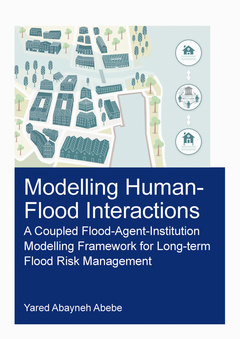Modelling Human-Flood Interactions A Coupled Flood-Agent-Institution Modelling Framework for Long-Term Flood Risk Management IHE Delft PhD Thesis Series
Auteur : Abebe Yared Abayneh

The negative impacts of floods are attributed to the extent and magnitude of a flood hazard, and the vulnerability and exposure of natural and human elements. In flood risk management (FRM) studies, it is crucial to model the interaction between human and flood subsystems across multiple spatial, temporal and organizational scales. Models should address the heterogeneity that exists within the human subsystem, and incorporate institutions that shape the behaviour of individuals. Hence, the main objectives of the dissertation are to develop a modelling framework and a methodology to build holistic models for FRM, and to assess how coupled human-flood interaction models support FRM policy analysis and decision-making. To achieve the objectives, the study introduces the Coupled fLood-Agent-Institution Modelling framework (CLAIM). CLAIM integrates actors, institutions, the urban environment, hydrologic and hydrodynamic processes and external factors, which affect FRM activities. The framework draws on the complex system perspective and conceptualizes the interaction of floods, humans and their environment as drivers of flood hazard, vulnerability and exposure. The human and flood subsystems are modelled using agent-based models and hydrodynamic models, respectively. The two models are dynamically coupled to understand human-flood interactions and to investigate the effect of institutions on FRM policy analysis.
Introduction, Theoretical Background, CLAIM: The Coupled Flood-Agent-Institution Modelling Framework, ffects of Formal and Informal Institutions on Flood Risk Management: The Case of Sint Maarten, The Role of Household Adaptation Measures to Reduce Vulnerability to Flooding: The Case of Wilhelmsburg, Hamburg, Germany, Insights into Conceptualising and Modelling Human-Flood Interactions, Reflections and Outlook, Appendices.
Yared Abayneh Abebe is a PhD researcher in Urban Water Systems at IHE Delft Institute for Water Education, Delft, The Netherlands. He received his BSc in Soil and Water Engineering and Management from Haramaya University, Ethiopia and his MSc in Water Science and Engineering, specialization Hydroinformatics from IHE Delft. His research interests include policy analysis, the use of agent-based and hydrodynamic models, and hazard, exposure, vulnerability and risk assessments in disaster risk management, with a particular focus on hydro-meteorological hazards such as floods and hurricanes.
Date de parution : 01-2021
17x24 cm
Thèmes de Modelling Human-Flood Interactions :
Mots-clés :
FRM Measure; Flood subsystems; Flood Risk; Human subsystem; EU Flood Directive; Human-water interaction; MAIA; Flood risk management; Sint Maarten; Repast Simphony; Flood Model; Urban Flood Modelling; Reduce Flood Hazard; Flood Hazard; Flood Insurance; Household Agents; Adaptation Behaviour; Flooded Houses; Rule Based Decision Tree; FRM Policy; Cellular Automata; ABM Software; Compliance Threshold; Vice Versa; Systems Thinking; PMT; Hydrosocial Cycle; Coping Behaviour



